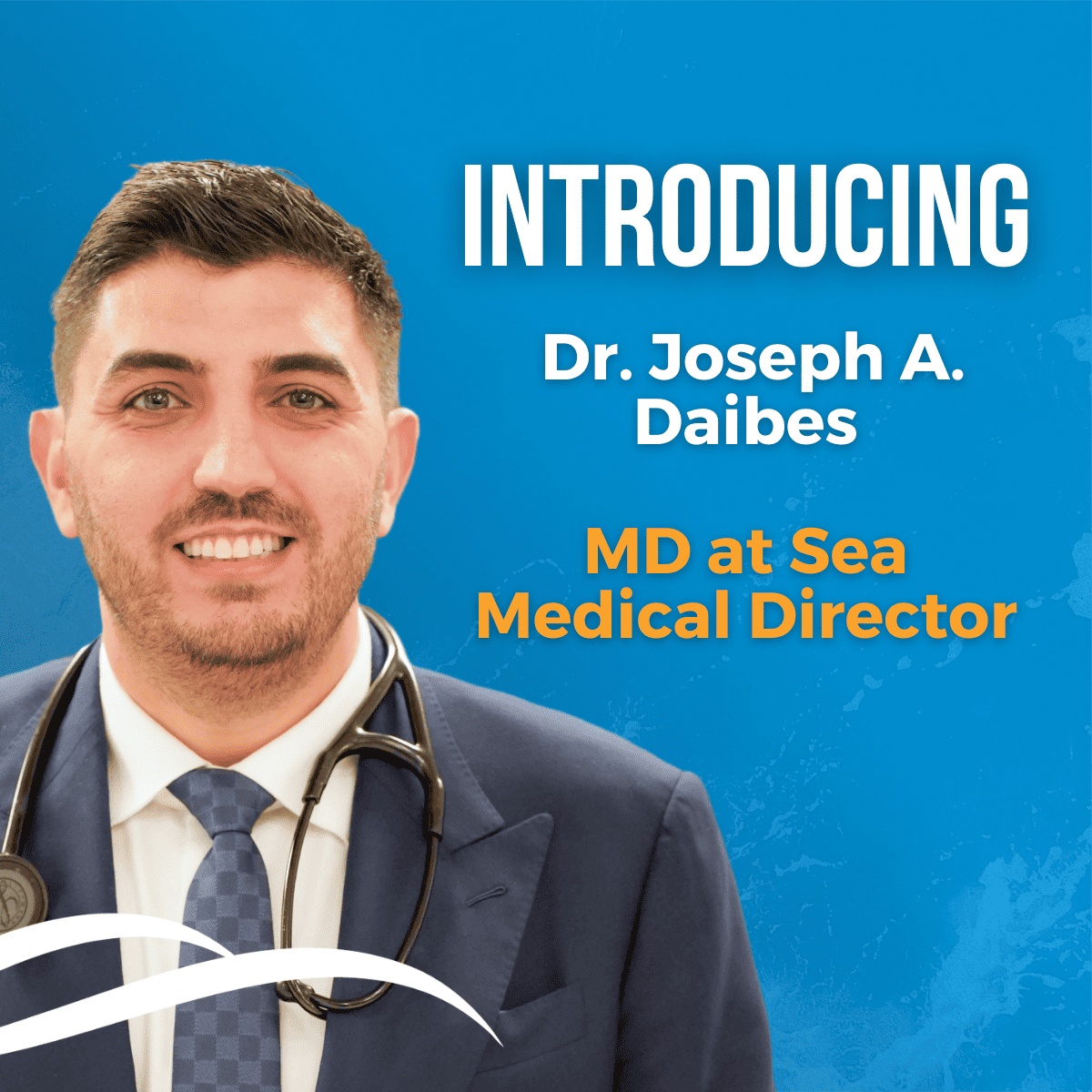
In this blog, we sit down with the Medical Director of Internal Medicine and Cardiology Services Dr. Joseph Daibes to talk about some of the differences and experiences with maritime medicine, especially as telehealth leads to faster, more positive outcomes for patients at sea.
Join Destiney Barker, our director of brand development, for this insightful Q&A.
Destiney Barker: Welcome, everyone. We have a special guest with us today, Dr. Joseph Daibes, the Medical Director of Internal Medicine and Cardiology Services for OrthoLive. Dr. Daibes, we’re delighted to have you here. To kick things off, could you tell us a bit about yourself and your impressive medical career?
Dr. Joseph Daibes: Thank you for the warm welcome, Destiney. It’s a pleasure to be here. Well, I’m Dr. Joseph Daibes, and I specialize in Interventional Cardiology, General Cardiology, and Internal Medicine. I’m based in New Jersey, where I run my own cardiology practice, New Jersey Heart and Vein, located in Clifton, NJ. Additionally, I work and do procedures at Lenox Hill Hospital in Manhattan, NYC.
My journey with OrthoLive began in July when I assumed the role of Medical Director. I’m genuinely excited about the potential for growth and the positive impact we can make in the world of maritime healthcare. On a more personal note, my family has always been fond of cruise vacations, and I’ve had the privilege of exploring over 20 different ships. This personal connection has given me unique insights into the challenges of accessing medical care at sea.
Destiney Barker: Your connection to cruise vacations brings a unique perspective to the discussion. We’re eager to learn more about your experiences and expertise, especially in the context of OrthoLive’s work on cruise ships.
Can you please explain what the OrthoLive Internal Medicine and Cardiology service entails?
Dr. Joseph Daibes: Our program is truly one-of-a-kind. It’s designed to deliver comprehensive routine and emergency medical care to crew members and passengers aboard cruise ships. We must give credit to the cruise ship doctors and healthcare workers who tirelessly work to assist patients, even when sailing in the middle of the sea and facing significant limitations in terms of medical resources.
Cruise ship doctors are highly trained, specializing in emergency protocols and general practice, and they do an exceptional job under challenging circumstances. However, it’s essential to recognize that the unique environment at sea can present medical challenges that go beyond their expertise. This is where our OrthoLive program comes into play. In critical situations, cruise ship doctors and healthcare workers can reach out to us, and we’re ready to provide immediate expert advice, guidance, and support. Our goal is to complement their exceptional efforts and contribute our specialized knowledge to these critical situations, often making life-saving decisions in collaboration with them. Together, we form a dynamic healthcare partnership that ensures the well-being of those on board, even in the most remote and challenging maritime settings.
Destiney Barker: Can you share your favorite aspect of working with OrthoLive on cruise ships?
Dr. Joseph Daibes: What I find most rewarding about working with the OrthoLive Maritime Service is the opportunity to make a meaningful difference in the lives of the hardworking crew members on these vessels. Cruise ship crews often find themselves in a unique and somewhat isolated environment. They work tirelessly, around the clock, to provide an unforgettable experience for travelers. It’s a true privilege to reciprocate their dedication with our specialized medical expertise.
We take immense pride in being able to ease their journey and empower them with well-informed decisions. Offering the latest in evidence-based medicine means that we bring the cutting edge of medical knowledge directly to the cruise ship, where access to such resources can be limited. We’re contributing to the overall health, well-being, and peace of mind of these crew members. We strive to ensure that they have access to the highest standard of care, just as they work tirelessly to provide top-notch services to the passengers.
In addition to assisting crew members, we’re also prepared to address passenger emergencies. Cruise vacations should be enjoyable and worry-free, but occasionally, medical situations arise among passengers that require immediate attention. These situations can be highly stressful for travelers and their families. Knowing that we can swiftly respond to these emergencies, provide expert guidance, and make life-saving decisions is a crucial aspect of our mission. Passengers can have peace of mind knowing that high-quality medical care is available even in the middle of the sea, ensuring a safer and more enjoyable cruise experience for all.
Destiney Barker: Could you elaborate on the key asset of this program?
Joseph Daibes: The crown jewel of our service is telemedicine. We’re equipped to provide video conferences and phone consultations 24/7/365 days a year. We always have a board-certified specialist on call, ready to assist with the services I’ve already discussed. This isn’t just conventional telemedicine; it’s a revolutionary approach to healthcare at sea.
What sets our program apart is that we’re not just delivering care from a distance; we’re building a groundbreaking network of medical experts and facilities in major port cities. This network ensures that crew members and passengers can seamlessly transition from virtual consultations to in-person visits ashore, often with the very same specialist they saw virtually on board.
This represents the cutting edge of healthcare in the maritime industry. It’s a bridge, connecting those on the sea with high-quality healthcare resources that were once distant dreams for many crew members. We’re not only improving their health but also enhancing the cruise ships’ capacity to keep their crew members in peak condition. It’s a true testament to the innovative and forward-thinking approach we bring to healthcare at sea.
Destiney Barker: I understand that you’ve already seen several crew members and passengers in person. Could you share more about that?
Joseph Daibes: Our office, located near major cruise ports in New York City and Cape Liberty, New Jersey, allows us to provide comprehensive medical care that goes beyond telemedicine. We can seamlessly facilitate visits for crew members and passengers to our office, where they can receive full-service testing and evaluation.
We can do all of this while ensuring they return to their ships well before ‘All Aboard’ time. It’s an intricate logistical dance that we’ve perfected to ensure that no one misses their ship departure. We take great pride in offering this level of convenience, ensuring that crew members and passengers can access top-quality healthcare during their stopovers.
Meeting crew members who come from diverse corners of the world, representing all walks of life, is a genuine pleasure. We have the privilege of witnessing incredible diversity and unique stories from those who work tirelessly on these ships. It’s a testament to the global reach of the cruise industry, and it’s an honor to serve such a diverse and international community.
Destiney Barker: Dr. Daibes, can you share an example or a memorable experience where your expertise made a significant impact on a cruise ship?
Joseph Daibes: One memorable experience comes to mind. We had a passenger who suddenly developed severe chest pain while onboard. The ship’s medical team did an excellent job stabilizing the patient, but the situation required a cardiology specialist’s intervention. They happened to be approaching Cape Liberty, NJ that very day.
Through our telemedicine service, I was able to quickly assess the situation and provide guidance for immediate treatment. We determined that the patient needed a cardiac procedure that wasn’t available on the ship. We coordinated their transfer to a nearby hospital, where I coordinated efforts to have them brought directly to the cardiac catheterization laboratory.
We performed the necessary procedure, and the patient made a full recovery. It was a testament to the effectiveness of our program and how we can seamlessly bridge the gap between shipboard care and specialized treatment onshore.
These moments reaffirm the importance of what we do and our commitment to delivering the highest standard of care in the maritime world.
Destiney Barker: Thank you, Dr. Daibes, for sharing your valuable insights and experiences with us today. It’s been enlightening to learn about the remarkable work that OrthoLive is doing in the world of cruise ship healthcare. Your dedication to providing top-quality care to crew members and passengers is truly commendable. We appreciate your time and expertise.
Joseph Daibes: Thank you, Destiney. And before we close, I want to extend an invitation to all ship doctors who may be interested in learning more about our program or discussing any aspect of maritime healthcare. I’m always available to assist and share our insights and experiences with anyone interested.
To learn more, visit OrthoLive.com/Maritime.



